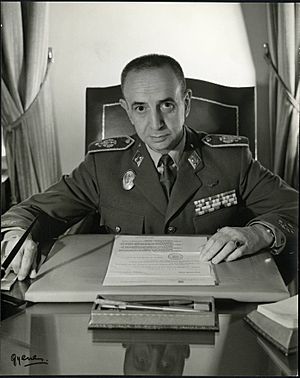Manuel Díez-Alegría facts for kids
Quick facts for kids
Manuel Díez-Alegría
|
|
|---|---|

Manuel Díez-Alegría in 1980, photographed by Juan Gyenes
|
|
| Ambassador of Spain to Egypt | |
| In office 20 February 1976 – 5 June 1978 |
|
| Monarch | Juan Carlos I |
| Preceded by | Manuel Alabart Miranda |
| Succeeded by | José Luis Flórez-Estrada y Ayala |
| Chief of the Defence High Command | |
| In office 23 July 1970 – 14 June 1974 |
|
| Leader | Francisco Franco |
| Preceded by | Agustín Muñoz Grandes |
| Succeeded by | Carlos Fernández Vallespín |
| Seat G of the Real Academia Española | |
| In office 20 January 1980 – 3 February 1987 |
|
| Preceded by | José María de Cossío |
| Succeeded by | José María de Areilza |
| Personal details | |
| Born |
Manuel Díez-Alegría Gutiérrez
25 July 1906 Llanes (Asturias), Spain |
| Died | 3 February 1987 (aged 80) Madrid, Spain |
| Education | Academy of Military Engineering of Guadalajara Colegio de la Inmaculada (Gijón) |
| Military service | |
| Allegiance | |
| Branch/service | |
| Years of service | 1923–1974 |
| Rank | Lieutenant general |
| Battles/wars | Spanish Civil War |
Manuel Díez-Alegría Gutiérrez (born July 25, 1906 – died February 3, 1987) was an important Spanish military officer. He held a very high position as the chief of staff for the Spanish Armed Forces from 1970 to 1974. This was during a time known as the Francoist dictatorship in Spain. Later, he also served his country as an ambassador.
Contents
Manuel Díez-Alegría: A Spanish Leader
Manuel Díez-Alegría Gutiérrez was born in Llanes, Asturias, Spain. He dedicated most of his life to serving his country. He was known for his intelligence and his ability to lead.
His Time in the Military
Manuel Díez-Alegría joined the military in 1923. He rose through the ranks to become a lieutenant general, which is a very senior position. From 1970 to 1974, he was the Chief of the Defence High Command. This meant he was the top military leader for all of Spain's armed forces. He played a key role during a period of big changes in Spain.
Serving as an Ambassador
After his military career, Díez-Alegría continued to serve Spain in a different way. He became the Ambassador of Spain to Egypt. He held this important diplomatic role from 1976 to 1978. This was during the Spanish transition to democracy, when Spain was moving from a dictatorship to a democratic government.
Other Important Roles
Besides his military and ambassador duties, Manuel Díez-Alegría was also involved in other important areas.
- He was a member of the Royal Academy of Moral and Political Sciences starting in 1968.
- He also joined the Royal Spanish Academy in 1980. This academy focuses on the Spanish language.
- From 1970 to 1977, he was a member of the Cortes Españolas, which was Spain's parliament at the time.
Awards and Honors
Manuel Díez-Alegría received many awards for his service to Spain. These awards recognized his dedication and achievements in both military and civil roles. Some of his notable awards include:
- Grand Cross of the Royal and Military Order of Saint Hermenegild (1961)
- Grand Cross (with White Decoration) of Military Merit (1964)
- Grand Cross (with White Decoration) of Naval Merit (1968)
- Grand Cross of the Imperial Order of the Yoke and Arrows (1969)
- Grand Cross of the Order of Isabella the Catholic (1970)
- Grand Cross of the Civil Order of Alfonso X, the Wise (1971)
- Grand Cross of the Order of Civil Merit (1977)
See also
 In Spanish: Manuel Díez-Alegría para niños
In Spanish: Manuel Díez-Alegría para niños
 | Aaron Henry |
 | T. R. M. Howard |
 | Jesse Jackson |

